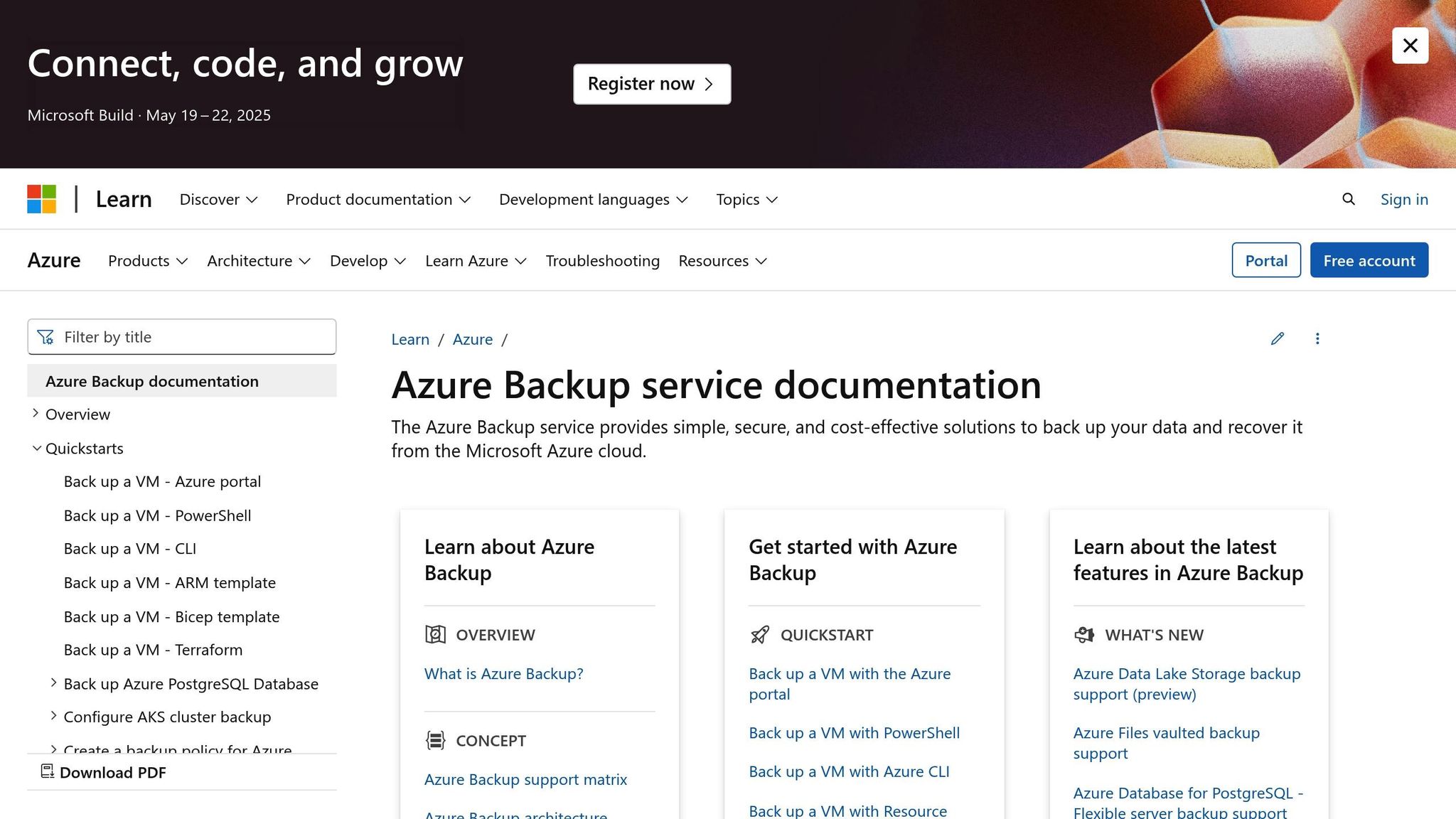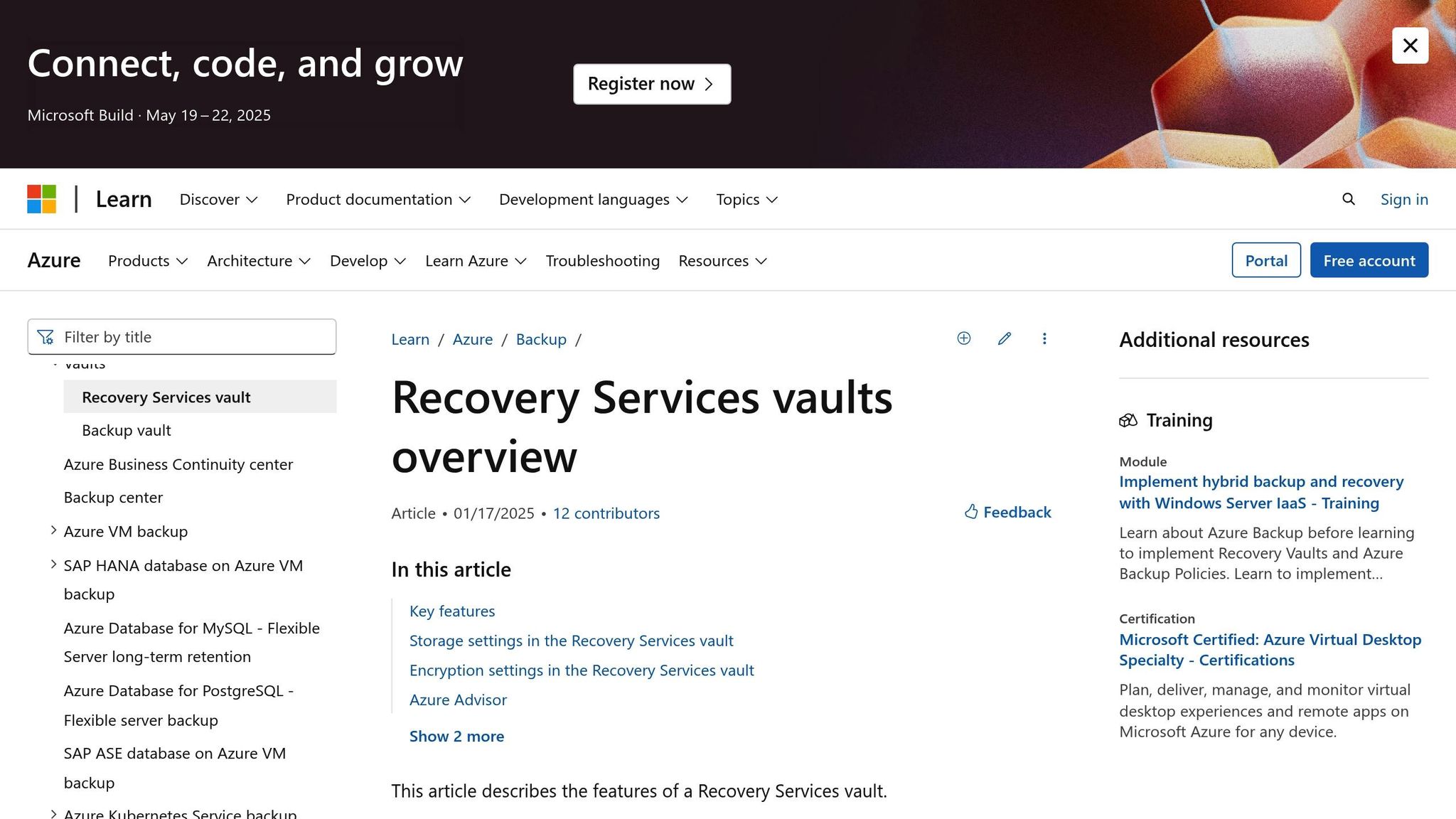Azure Backup Options for Small Businesses
Explore cost-effective Azure Backup solutions for small businesses and learn how to protect your data with flexible storage options and robust security measures.

Protect your business data with Azure Backup - simple, secure, and cost-effective.
Small businesses face risks like data loss from cyberattacks or system failures. Azure Backup offers a scalable, pay-as-you-go solution to safeguard your data without the complexity of traditional on-premises systems.
Key Benefits:
- Affordable Pricing: Start from £4/month for small data volumes.
- Flexible Storage Options: Choose from locally-redundant (LRS) at £0.018/GB or geo-redundant (GRS) at £0.036/GB.
- Strong Security: Multi-factor authentication, ransomware protection, and encrypted backups.
- Easy Management: Centralised tools for monitoring and policy enforcement.
Quick Overview:
| Feature | Details |
|---|---|
| Pricing | From £4/month + storage costs |
| Storage Options | LRS, ZRS, GRS, Archive tiers available |
| Security Features | Role-based access, soft delete, encryption |
| Backup Management Tools | Backup Centre, PowerShell, REST APIs |
Azure Backup simplifies data protection while adhering to UK compliance standards, making it a reliable choice for small businesses.
Azure Backup: Azure Backup Center Overview, Cost ...

Azure Backup Core Tools
Azure Backup provides small businesses with a straightforward way to protect their data while maintaining strong security measures. These tools are designed to simplify management and ensure dependable backup solutions.
Recovery Services Vault Basics

The Recovery Services vault is a key component of Azure Backup, serving as a central hub for backup data. It simplifies management and supports various workloads, such as:
- Azure IaaS VMs (both Windows and Linux)
- SQL Server databases hosted on Azure VMs
- On-premises systems through System Center DPM
- Windows Server backups
- Azure Backup Server setups
The vault also strengthens security with features like multi-user authentication and customer-managed keys. Microsoft backs these measures with a substantial annual investment of over £800 million in cybersecurity research.
UK Storage Options and Costs
Azure provides several storage options tailored to meet the needs of UK businesses. Each option is designed for specific use cases:
| Storage Type | Cost (per GB/month) | Ideal For |
|---|---|---|
| Locally Redundant (LRS) | £0.018 | Budget-conscious businesses with local compliance needs |
| Zone-Redundant (ZRS) | £0.022 | Businesses needing high availability within a region |
| Geo-Redundant (GRS) | £0.036 | Organisations requiring cross-region data protection |
For long-term storage, the Archive tier offers even lower costs:
- LRS Archive: £0.002 per GB/month
- GRS Archive: £0.004 per GB/month
These rates reflect standard storage pricing, but actual costs may vary depending on factors like commitment duration and usage volume.
Backup Management Tools
Azure Backup provides a variety of management tools to suit different needs. The Backup Centre acts as the main console, allowing businesses to:
- Monitor backup statuses from a single location
- Manage backup policies across multiple vaults
- Enforce compliance automatically
- Access detailed reports and analytics on backups
For businesses looking to automate processes, PowerShell cmdlets and REST APIs offer flexibility for tasks like scheduling, policy management, and integration with existing IT workflows. Additionally, Microsoft employs over 3,500 security experts to ensure these tools are updated to address new threats and comply with changing regulations.
Selecting Your Azure Backup Plan
Business Requirements Check
Before choosing an Azure backup plan, it’s crucial to assess your needs. Consider factors like how much data you need to store, recovery goals, compliance requirements, and your budget. Documenting these specifics will help you make the right choice:
| Requirement Category | Key Considerations | Impact on Plan Selection |
|---|---|---|
| Data Volume | Current size and growth rate | Refer to Azure pricing details |
| Recovery Needs | Business-critical systems RTO | Influences storage type |
| Compliance | GDPR and UK data residency | May require UK datacentres |
| Budget | Monthly storage allocation | Affects redundancy and retention |
A stark statistic highlights the importance of backups: 94% of businesses that suffer severe data loss don’t recover, and 51% shut down within two years. With your requirements in hand, align them with the backup features outlined below.
Backup Features Selection
Once you’ve reviewed storage options, match Azure’s features to your needs for a reliable backup plan:
-
Storage Redundancy Options
For businesses in the UK, Azure offers three main storage types (pricing aligns with earlier storage options):
- Locally redundant storage (LRS)
- Zone-redundant storage (ZRS)
- Geo-redundant storage (GRS)
- Backup Frequency Set up weekly full backups and daily differential backups for databases like SQL and SAP HANA.
-
Data Protection Features
Strengthen security by enabling features such as:
- Role-based access control
- Soft delete protection
- Multi-user authentication
- Customer-managed encryption keys
Reducing Backup Costs
Managing costs effectively is key to staying within your budget. Azure offers tools to help cut expenses. Sean DeLessio, Lead Engineer at Russell Reynolds, shares his experience:
"We don't have to worry about managing space on expensive, purpose-built backup storage systems. We have no tape costs, management costs, nothing. Backup is dramatically cheaper with Azure".
Here are some strategies to lower your backup costs:
-
Reserved Capacity
For predictable workloads, opt for reserved capacity plans:
Commitment Period LRS (100 TB/month) Savings vs Pay-as-you-go 1-year £19,377 20% 3-year £52,848 35% -
Storage Adjustments
- Use selective disk backups for Azure VMs.
- Move long-term data to the archive tier.
- Remove backups for deleted resources.
- Adjust retention periods to meet compliance without over-allocating storage.
-
Monitoring and Fine-Tuning
Use Azure Backup reports to track:
- Unused storage
- Redundant backup instances
- Opportunities to improve policies
- Cost trends and forecasts
Setup and Performance Tips
First-Time Setup Steps
To get started with Azure Backup, follow these steps:
-
Create a Recovery Services Vault
- Choose a new or existing resource group.
- Set a vault name between 2–50 characters.
- Pick a UK region for the vault.
- Begin with LRS (Locally Redundant Storage) for storage redundancy.
-
Set Up a Backup Policy
The default policy includes daily backups with a 30-day retention period. For specific workloads, like SQL databases, create custom policies tailored to their needs. -
Enable Backup Protection
Select the workloads you want to protect and ensure they match the region of your vault. Enable backup protection to secure these resources.
Once your setup is complete, you can shift your attention to managing costs effectively.
Cost Control Methods
To stay within your budget, consider these cost-saving measures:
- Schedule backups during off-peak hours to reduce operational impact.
- Use selective disk backups to avoid unnecessary data duplication.
- Apply retention policies that align with your compliance needs without over-retaining data.
- For predictable workloads, explore reserved capacity options to lower costs.
After implementing these methods, it's essential to keep an eye on your backup performance.
Backup Monitoring Guide
Azure's Backup Centre provides tools to manage and monitor backups. Use these tasks to ensure everything runs smoothly:
-
Daily Monitoring
- Check storage usage and alert statuses.
- Review the status of backup jobs.
- Confirm that backups comply with your policies.
-
Weekly Management
- Generate detailed backup reports.
- Analyse storage usage trends to identify inefficiencies.
- Review and adjust retention policies as needed.
- Remove unused resources to free up storage.
For deeper insights and automated monitoring, integrate Azure Backup with Log Analytics. This will give you a more detailed view of your backup operations.
Data Protection and Rules
Security Measures
Azure Backup uses multiple layers of security to keep your data safe.
Data Protection
- Data is encrypted during transit (using HTTPS and TLS 1.2+), at rest with Microsoft-managed keys, and through MARS agent encryption secured by a unique passphrase.
- Backup management is safeguarded with role-based access control (RBAC), multi-user authorisation, and private endpoints.
- Features like soft delete retention (14 days), immutable storage, and isolated storage within Microsoft-managed subscriptions add extra protection.
"One of the most important steps you can take to protect your data is to have a reliable backup infrastructure. But it's just as important to ensure that your data is backed up in a secure fashion, and that your backups are protected at all times." - Azure Backup | Microsoft Learn
UK Data Laws
Azure Backup complies with strict UK data regulations, making it easier to meet GDPR and UK data protection standards with its built-in features.
Key Compliance Features
- Options for UK data residency
- Use of pseudonymous identifiers to reduce privacy risks
- Detailed audit logging capabilities
- Full control over data location and replication
"Microsoft designed Azure with industry-leading security controls, compliance tools, and privacy policies to safeguard your data in the cloud, including the categories of personal data identified by the GDPR." - Microsoft
Backup Testing Rules
Regular testing is essential to ensure backups remain reliable and compliant.
Essential Procedures
- Perform monthly restore tests using Cross Region Restore, and document results along with recovery times for compliance purposes.
- Use Azure's tools to track backup status, storage usage, security alerts, and adherence to policies.
- Keep detailed records of backup and restore actions, security incidents, policy changes, and compliance reviews.
Conclusion
Azure Backup offers small businesses a straightforward way to protect their data without the complexity of enterprise-level solutions. Its pay-as-you-go pricing model helps manage expenses while delivering high-level security.
Microsoft has demonstrated its dedication to cybersecurity with a £16 billion investment over five years, including £800 million annually in research and development, supported by 8,500 security professionals across 77 countries. This infrastructure has proven effective, as shown by a Somerset municipality saving six figures while backing up 2,790 system streams.
Key features like role-based access control and multi-factor authentication protect against modern threats, including ransomware. Businesses can also choose between locally redundant storage (LRS) and geo-redundant storage (GRS) to balance cost and reliability in their backup strategies.
For small businesses aiming to secure their operations for the future, Azure Backup evolves to meet new threats and compliance standards. With the largest certification portfolio among cloud providers and full adherence to UK data protection rules, it ensures data security for growing businesses.
FAQs
How can Azure Backup support small businesses in meeting UK data protection requirements?
Azure Backup provides a secure and reliable way to protect your small business's data, helping you meet UK data protection requirements. It ensures your data is safely stored in the Microsoft cloud, with features like role-based access control to manage backup operations effectively.
Azure Backup services are hosted in UK data centres, offering localised and cost-effective solutions for safeguarding your information. These services are designed to help small businesses maintain compliance by ensuring data is encrypted, easily restorable, and protected against unauthorised access. This means you can focus on running your business with peace of mind, knowing your data is secure and compliant with UK regulations.
How can small businesses save money using Azure Backup effectively?
To save costs with Azure Backup, small businesses can take several practical steps:
- Clean up unused backups: Regularly delete backups for resources you no longer need to avoid unnecessary storage costs.
- Optimise retention policies: Review and adjust how long you retain backups, ensuring you meet compliance requirements without overcommitting storage.
- Use incremental backups: Focus on incremental backups instead of full backups to reduce storage and bandwidth usage.
- Exclude unnecessary data: When backing up virtual machines, exclude disks that don’t need protection to save on storage.
- Consider reserved capacity: Committing to a one- or three-year Backup Storage Reserved Capacity plan can significantly reduce your costs.
By implementing these strategies, small businesses can optimise costs while maintaining reliable and secure backup solutions tailored to their needs.
How can I choose the right Azure Backup storage option for my small business?
To select the best Azure Backup storage option for your small business, focus on these key factors:
- Data size and type: Assess the size of your data and the type of workload you're backing up (e.g., virtual machines, databases, or file shares). This impacts both costs and storage requirements.
- Backup frequency and retention: Determine how often you'll back up your data and how long you'll need to keep it. More frequent backups or longer retention periods may increase costs.
- Storage tier and redundancy: Choose between the Standard and Archive tiers. Standard offers faster access, while Archive is more affordable for long-term storage. Also, consider redundancy options like Locally Redundant Storage (LRS) or Geo-Redundant Storage (GRS) based on your reliability needs.
For cost optimisation, use incremental backups and apply efficient retention policies. You can also explore reserved capacity options for long-term savings. These considerations will help ensure your backup solution is both cost-effective and reliable.




